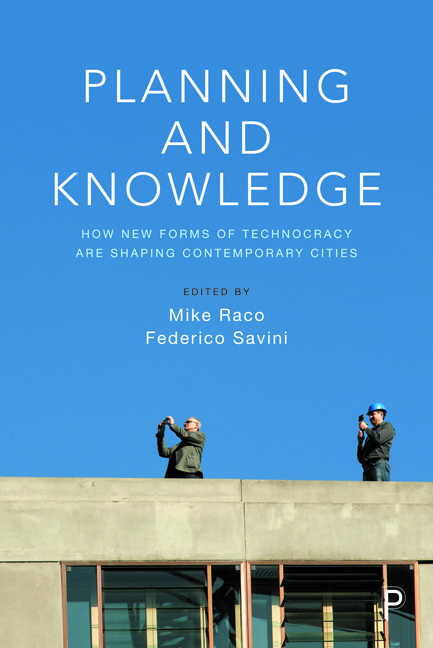Book contents
- Frontmatter
- Contents
- List of figures
- List of tables
- Notes on contributors
- Part I Conceptual framings of technocracy
- Part II Public planning and bureaucracies in contemporary urban development politics
- Part III Corporate knowledge and the land and property development sector
- Part IV Private consultants and the delivery of public policy
- Part V New constellations of actors and the management and governance of contemporary cities
- References
- Index
7 - Anticipatory knowledge: how development consultantssee the future
Published online by Cambridge University Press: 30 April 2022
- Frontmatter
- Contents
- List of figures
- List of tables
- Notes on contributors
- Part I Conceptual framings of technocracy
- Part II Public planning and bureaucracies in contemporary urban development politics
- Part III Corporate knowledge and the land and property development sector
- Part IV Private consultants and the delivery of public policy
- Part V New constellations of actors and the management and governance of contemporary cities
- References
- Index
Summary
The expected ripple effect of GE (GeneralElectric)'s move to Boston: The industrial giantsays 800 jobs will be based in its new corporateheadquarters. (BostonGlobe, 14 January 2016)
What happens if GE's jobs don't pan out? (Boston Globe, 10 April2016)
Introduction
John Maynard Keynes (1936) stressed that economicdecisions are always made in the context of greatuncertainty because they are based on an‘unchangeable past’ and aimed at what he called a‘perfidious future’. The same sentiment would applyto decisions made by planners, who act on futureeconomies through both knowledge of them – gainedfrom techniques like forecasting and predictiveanalytics – and the capacity to intervene in waysthat potentially influence them.
Today, future knowledge is more commonly generated byprivate consultants than by planners or developersthemselves. Economic development experts conductregional economic modelling and produce forecasts tohelp local governments imagine the costs andbenefits of major transformations, like the arrivalof a corporate headquarters. These same consultantsalso work for private actors – developers andcorporations – to demonstrate the ‘public purpose’and ‘economic impact’ of their prospective projects,which often leads to the transmission of public landand financial subsidies for development. In thissense, consultants are one of the strategic bridgingagents between state and economy, providing the gluethat has allowed myriad public– private partnershipsto flourish (Weber and O’Neill-Kohl, 2013).
In this chapter I will discuss how the anticipatorygaze – what some call ‘expectancy’ – is formalisedin the tools and techniques used by theseconsultants given the uncertainties associated withlarge-scale investments and the volatility of theglobal economy. In doing so I am making the claimthat planning technocracies can be understoodthrough their ‘instruments’ (Lascoumes and Le Galès,2007) and ‘governmental technologies’, that is, the‘complex of mundane programmes, calculations,techniques, apparatuses, documents and proceduresthrough which authorities seek to embody and giveeffect to governmental ambitions’ (Miller and Rose,1990: 175). By enquiring the inner working logics oftechnical instruments used by policy makers andplanners, it is possible to explain why certainexpertise becomes so central in the definition ofpublic policies and to question how technocraticlogics of planning are enacted andinstitutionalised.
- Type
- Chapter
- Information
- Planning and KnowledgeHow New Forms of Technocracy Are Shaping Contemporary Cities, pp. 91 - 102Publisher: Bristol University PressPrint publication year: 2019



